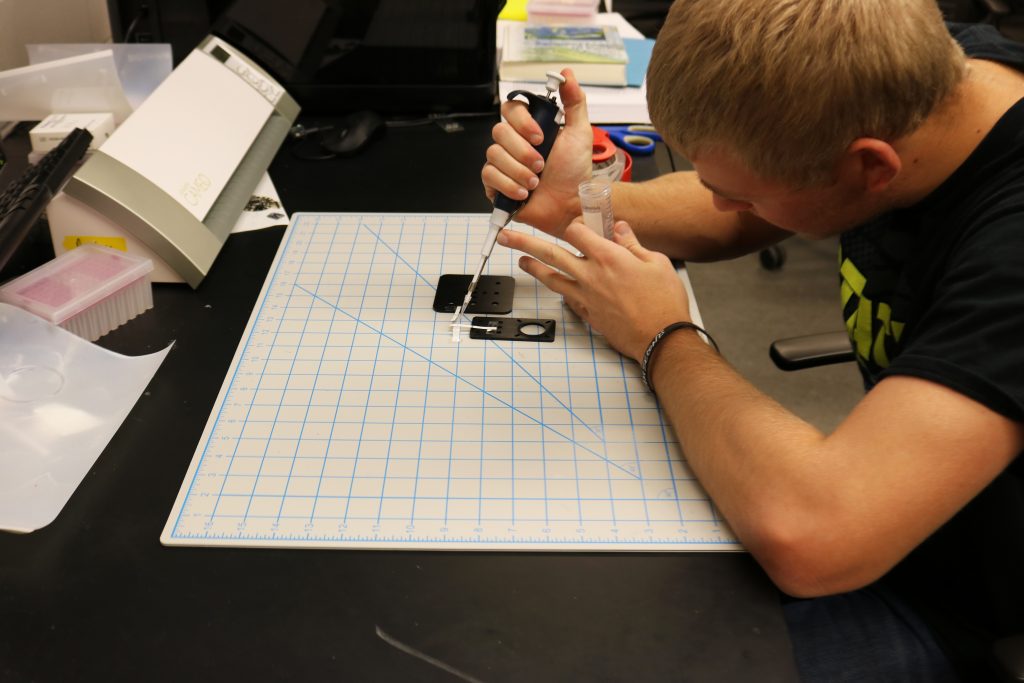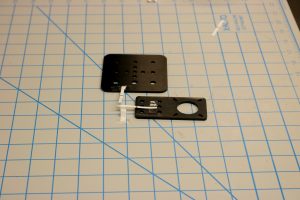 Few college freshmen have the opportunity to impact the world’s healthcare needs, but one Iowa State University student was given that chance.
Few college freshmen have the opportunity to impact the world’s healthcare needs, but one Iowa State University student was given that chance.
Shawn Flanigan became a joint first author on an innovative research paper as an undergraduate student at Iowa State. Beginning the research during his freshman year, the now junior studying mechanical engineering joined Santosh Pandey, associate professor with the Department of Electrical and Computer Engineering (ECpE), in researching paper devices that could potentially benefit healthcare in third-world countries.
The goal was to make these devices on paper to be more accessible to people. The paper strips could eventually be used as an at-home device that would test the quality of food and water or for healthcare, like blood and urine analysis.
“Devices and chips have been made on glass slides, which are good, but you still would need access to fabrication lab facilities,” Pandey said. “These are okay, but if you’re trying to do experiments where you need a lot of chips, or are in a remote area where there is no access to electricity, there is a need for an alternative.”
Flanigan played a big role in the creation of these simple devices. The tests were conducted on paper strips, something that would be easily accessible to people in third-world countries.
“I was the one making all of the systems [paper strips] and doing all the tests on the systems,”  Flanigan said. “I would pipette onto the paper, cut the paper and would monitor the progress of the tests.”
Flanigan said. “I would pipette onto the paper, cut the paper and would monitor the progress of the tests.”
Flanigan started his paid research position during his first semester at Iowa State. Beginning his lab work in November 2015, he started this project during his second semester of college.
“I talked with Dr. Pandey about being an SI [Supplemental Instruction] leader for Engineering 160, which is a class he teaches,” Flanigan said. “Pandey had asked me if I’ve ever thought about doing research.”
It is not very common to find undergraduate students taking part in a professor’s research. Graduate students typically conduct research under a professor; however, Flanigan was given the rare opportunity as an undergraduate to work with Pandey on his research.
Flanigan was first given small tasks and things to do in the lab. Pandey, like most researchers, always has potential research plans on the back burners. One of those plans was this project.
“It started with small things here and there and grew into this big project,” Flanigan said.
Being a part of such a large project early in his college career has taught Flanigan a lot about collaborating with others and undertaking challenging tasks. An ECpE graduate student of Pandey, Teajoon (TJ) Kong, was listed as the other co-first author of the publication.
“TJ was a big help to me and gave me a lot of advice when we were first starting everything,” Flanigan said.
Flanigan cited communication and problem solving as the two biggest takeaways from this experience. Being mindful of colleagues’ opinions and keeping everyone on the same page required a lot of open and constant communication between Kong, Pandey and Flanigan. Additionally, the group always had to be prepared to overcome any obstacles.
“There were a lot of times that things we had talked about on the whiteboard weren’t going to work, and we weren’t going to meet for another week,” Flanigan said. “I had to figure out something; I wasn’t going to just twiddle my thumbs for a week.”
Being a part of a potentially impactful paper early in his college career has opened many doors for Flanigan. As far as what is next for Flanigan, he is keeping his options open and looking forward to completing another internship this summer.